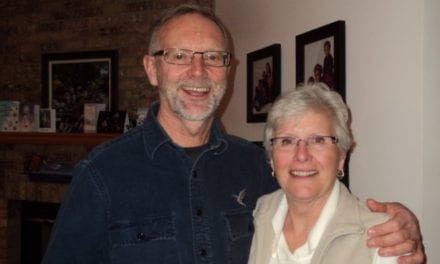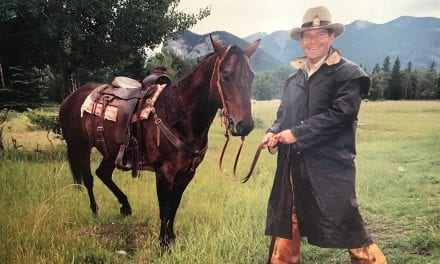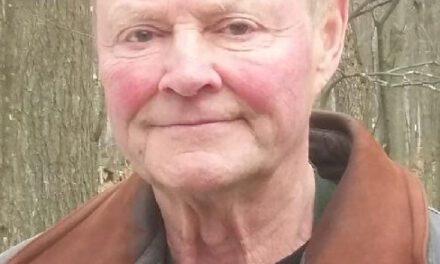This Oral History interview was funded in part by a research grant received in 2021 from the Government of Alberta through the Alberta Historical Resources Foundation.
Park Warden Alumni Society of Alberta
Oral History Phase 11 Spring 2021
Interview with Barb Bertch
Date/time: May 8 2021
Interviewed by Monique Hunkeler and Reg Bunyan
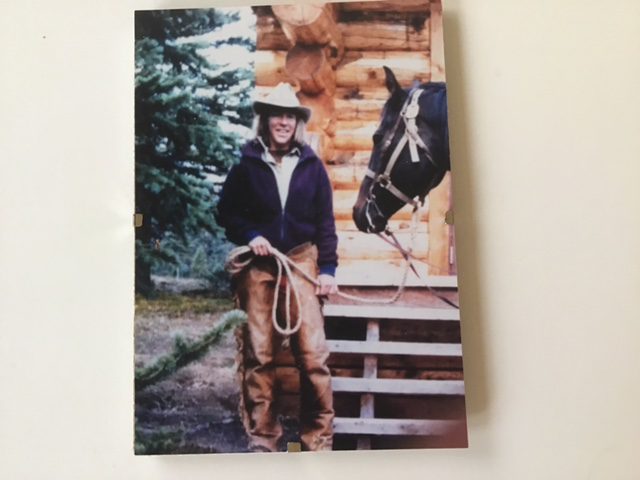
Barb in the Backcountry
Place and date of birth
August 27, 1949 Youngstown, Ohio, USA. The heart of what is now called the rust belt. The place was so industrialized and polluted, the Mahoning River actually caught on fire in the late 60’s. I grew up about as far from a natural environment as humanly possible.
Where did you grow up?
Same place. Although this was a heavily industrialized area, there were pockets of nature that I was always attracted to. My father had been in the Coast Guard and loved being on the water and we spent a lot of time as children on the Great Lakes.
How did you become involved with the Warden Service?
It’s a long story. I left Youngstown the moment I could as I knew there had to be better places in the world. I moved to Greenwich Village in New York, went to university, got involved in anti-Vietnam war protests and worked as a bike courier in New York City. Although New York was a better place then Youngstown, I wasn’t completely happy there either. After a couple of serious bike/vehicle wrecks, the last straw was when a junkie stole my fancy Italian racing bike. I knew I had to leave. My boyfriend at the time lent me his bike and I flew to Oregon. Cycled up the coast of the USA to Vancouver Island and over to Banff, where my money ran out and winter hit. But I thought I had died and gone to heaven. Surrounded by nature, mountains and clear water. I got married to Reg Bunyan, became a Canadian Citizen, worked at a variety of jobs, including Sunshine Village, Trail Crew in the Kananaskis, went back to school and got a diploma in Environmental studies at Lethbridge College. I also got seriously into cross-country ski racing at the National level. To wind up this story, it was combination of Reg getting a job with the Warden Service and Keith Everts (who I knew through Reg and ski racing), both encouraging me to apply. A summer local competition came up and I got my foot in the Banff door. I initially worked for Billy Browne doing wildlife work. Campgrounds the following year and the usual rotation of Banff seasonal warden jobs.
What made you want to join the Warden Service?
As a child, I remember a family trip to Colorado, the mountains, space and nature. I knew I wanted to go back to the mountains somehow and somewhere. As a child I read every book on wild cats and Africa. Deep down inside, I knew I ultimately wanted to be in a wild place and work with wildlife. Like a lot of people who come to Banff, you ultimately realize that if you are going to stay here you need to find a good, reasonable paying and interesting job. Although I really liked the physical activity of working on trail crew, as I moved into a more supervisory role, the job became less appealing. Travelling with Reg in the backcountry on days off, going to Warden parties, listening to the stories and all the characters made it seem like a very appealing job.
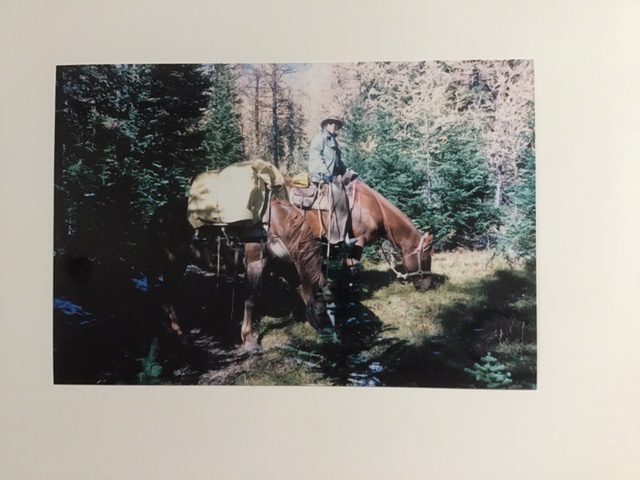
Barb and her horse team
What different parks did you work in, how did they compare and what was your favourite
Banff, Kootenay and in Lake Louise when the latter became part of the Lake Louise/Yoho/Kootenay Field Unit.
Our move to Kootenay was a bit of a rude shock. In Kootenay, we did not have the privilege of living in a National Park. Lots of driving, not much excitement, limited skiing opportunities and more difficult access to the backcountry. My memories are slightly tarnished by health problems that started shortly after we moved there. I was a serious runner and skier but started having major knee problems shortly after we got there. After 2 years in Kootenay National Park, we transferred to Lake Louise. I loved living in Lake Louise. I could cross country ski out my back door It was wilder and more remote, we had the privilege of living in the most scenic part of Canada, wonderful ski touring, lack of crowds, easily accessible mountaineering, a constant variety of interesting work. I could go on forever, but Lake Louise was the highlight of my life and career. We were there for 13 wonderful years.
My main responsibilities over the years
General warden duties, including backcountry, working in the campground doing Law Enforcement, wildlife corridor work, lynx study, bear and wolf trapping with Mike Gibeau, highway monitoring, Environmental Assessment monitoring. Pretty much the full gamut. But I’d say the majority of my work was wildlife related and that was what I enjoyed the most. As more physical problems developed with my knees culminating in a artificial knee replacement, backcountry and public safety opportunities became less frequent, although I was able to get out frequently on skis for my wildife corridor transect. I gradually moved into doing more GIS work culminating in a GIS Specialist Position to finish out my career.
What did you like (didn’t like) about being a Warden?
The opportunity to develop new skills, training opportunities, rescues, ski and climbing schools. The sense of teamwork, camaraderie, the opportunity to work in different places, different people. Seeing the entire park and understanding how important it was to maintain the wilderness we have. And most importantly, I always felt like I was making a difference. I always enjoyed the work and the people I worked with and the teamwork of participating in a rescue in whatever role, helping push bears out of town, taking care of the horses etc.
I didn’t care for my summer of working in the campground doing Law Enforcement. It wasn’t so much the Law Enforcement but the night shifts, lack of supervision/direction and dealing with obnoxious drunks. At times it could be quite boring when the weather was cold, wet or more commonly, both.
What are some of the memorable events of your Warden career?
A training climb with Tim Auger on Kahl Wall, Yamnuska with Tim Auger and Reg. That was a notable long classic hard route at the time, 5.9A with lots of challenging moves. It was so much fun, especially being out with Tim, who was one of the original pioneers of the route. It was very challenging for me and close to my physical limit. Tim later wrote up in my evaluation “Barb can strangle a 5.9A.” He always managed to find humour and put a positive spin on everything.
Travelling in the more remote areas of the backcountry by myself. The solitude, the wilderness and the wildlife. Especially before the elk, goat and sheep populations plummeted.
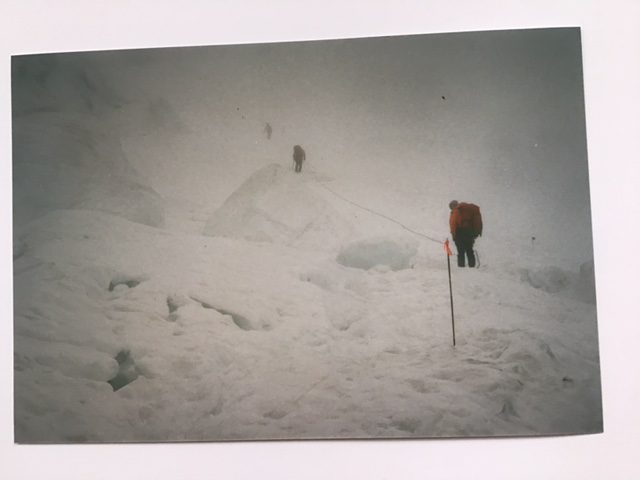
Mountaineering with the team in a whiteout
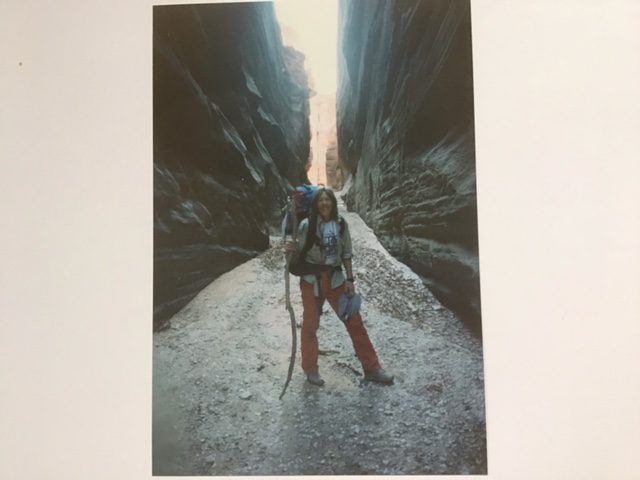
Canyoning
Like all Warden staff, I was drawn upon to go to a number of searches/fatalities. I didn’t enjoy any aspect of these, even the teamwork. Two incidents in particular were difficult. One was the young man I found while on patrol on Settlers Road, who had committed suicide by running the exhaust pipe into his car. I had to smash open the window and drag him out but it was too late. The worst one was the two young children at Marble Canyon there were killed by a falling tree. The young children were like broken baby dolls, the parents were grief struck beyond comprehension and the god damned coroner wouldn’t let us move the bodies. We all sat there for two hours waiting for the coroner, feeling the parent’s grief and feeling utterly helpless.
Memorable Events
No one big event stands out, just a kaleidoscope of good memories. I really enjoyed the wildlife corridor work, working on my own and putting tracking sequences together. One of my interesting tracking sequences was coming across wolverine tracks the morphed into a chase sequence with a mule deer, which it eventually pulled down in deep snow. The caching behaviour was particularly interesting, with this relatively small predator, caching the head, legs and various body parts over a widespread area.
I’ve always had a soft spot for wolverines, perhaps partially because you only see them in real wilderness areas. I really enjoyed assisting Tony Clevenger with his wolverine study, trying to determine population numbers, distribution and denning sites.
How has the Warden Service changed over the years?
I was part of the first wave of female hiring in the Warden Service, behind pioneers like Diane Volkers. It was still very much male dominated, when I started, probably less than 10% female. I wasn’t particularly conscious of being treated any differently because of my gender; I was just happy for the work and the learning opportunities. There was a distinct hierarchy within the Warden Service but this wasn’t gender based but rather seniority based, with those who had put in their time and gained experience at the top of the hierarchy. Because I had travelled with Reg, attended Warden parties and felt like I knew everyone even before I started and perhaps that made a difference.
When I started, training opportunities and professional development opportunities were very limited and particularly for the newer staff. Over time, this got significantly better. And even before the sidearm issue started, the role of the generalist was slowly disappearing.
I’m out of touch with most of the new staff but even when I was still working the idea of the Warden lifestyle was changing. When I started, we all lived and breathed work, 24/7. Our colleagues were our friends and our work coincided with our interests, so it never felt much like work. Work related conversations often seem to dominate time off. That seemed to all start changing about 15 years ago and it felt like that change was accelerating when I left.
What about the WS was important to you?
I always felt passionately about protecting National Parks and the Warden Service has always been the true guardians within Parks Canada. Being a member of that team was very important to me. I loved being on the land, seeing the remote backcountry that so few other people had the opportunity to see. Being out on the landscape gave me a true understanding of the ecological and human use changes that were happening over time; unlike so many deskbound workers in other Parks Canada functions.
Are there any legendary characters or stories that you can share?
Everyone I started with was legendary. While not everyone could do everything, we had people like Tim Auger, Don Mickle, Keith Everts, Dale Loewen that had amazing skills. People were tough and you had to be physically and mentally tough to fit in.
Is there anything about the Warden Service as you knew it, that you would want further generations to know?
There was less political correctness, less preoccupation with Occupational Health and Safety, more emphasis on common sense and in some respects a much simpler time. Not that everything was perfect. The job was potentially enormously complex with so many things to learn and so many skills to pick up. The WS had a long and proud history, much of which seems to have disappeared in the rush to change Parks Canada.
What made the Warden Service such a unique organization?
It was assumed that you were smart and a hard worker or you wouldn’t have been hired. You were given a tremendous amount of personal responsibility and freedom with very little hand-holding. Staff worked extremely hard and it was far more than just a job. It was a lifestyle. People worked well together and given the diversity of skills, education and interests, there was very much a common bond and similar goals. This changed over time and not for the better as jobs inevitably became more specialized, as the sidearm issue started to dominate and more tensions arose with the Warden Service.
Do you have any lasting memories as a Warden?
Lake Louise in Banff National Park. I loved living in Lake Louise, for the cross country skiing opportunities out the back door, the proximity for alpine ski touring and accessible hiking. The most exciting place to in the entire National Park System to work. All the excitement of working in Banff with less of the crowds and petty politics. More bears and more rescues.
Many fond memories of weekend escapes in the summer to warden cabins. Goodsir and Wolverine cabins in particular. During the summer months, work was extremely demanding and the opportunity to go to these rarely visited areas allowed me to decompress and face the following week.
Do you ever miss being a warden?
I miss being in the backcountry, access to cabins, the camaraderie. And I still miss living in Lake Louise. I still have many close friends from work time.
Do you have memorabilia?
Just my old Stetson and a few papers from work.
When did you retire? What do you enjoy doing in retirement?
2014, September. Ski, ski, ski, hike, bike, wilderness canoeing, travel, wildlife and bird watching, camping. Many of the same things I used to do with the Warden Service but without all the paperwork and bureaucracy. I have two artificial knees and that has slowed me down a bit but being outside is still so important to me.
Is there anything else you think I should know?
Nope
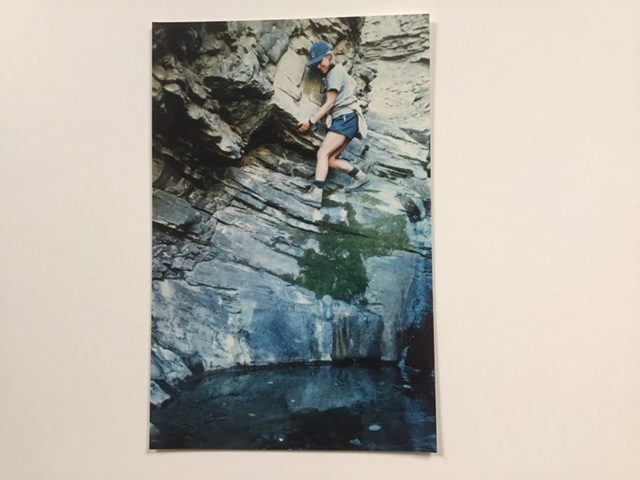
Always doing what she loves
Monique Hunkeler
Monique Hunkeler first started working with Parks Canada in 1989 as Secretary to Banff National Park Finance Manager. She moved into a position as Dispatcher for the Banff Park Warden Service and later worked within Banff National Park and Town of Banff’s IT departments. She is experienced with the interviewing, transcription and archiving process the Park Warden Service Alumni Society.
